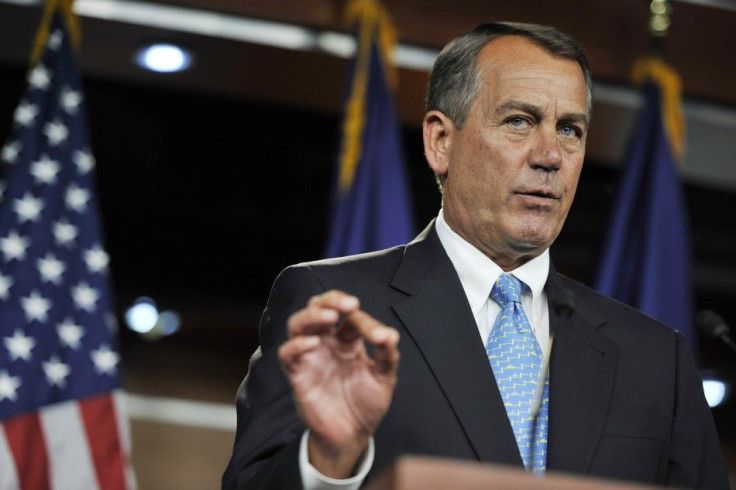Boehner: Democrats Preventing a Debt Deal, not GOP

Analysis
House Speaker John Boehner, R-Ohio, did not mince words Monday regarding who the American people should blame, if the U.S. Government defaults on its debt and Congress fails to raise the debt ceiling: President Barack Obama and Congressional Democrats.
This boils down to two things.The president continues to insist on raising taxes, and [Democrats] are just not serious enough about fundamental entitlement reform to solve the problem, Boehner said, CBSNews reported. It takes two to tango, and they're not there yet.
However, Boehner said he agrees with President Obama that the debt ceiling must be raised. We cannot allow our nation to default on our debt, Boehner said.
Earlier, at a Monday news conference, President Obama said: We're going to resolve this. However, Obama added that there is strong resistance on Republican side to do anything on revenue -- any revenue increase -- and there won't be a deal to raise the debt ceiling and cut the budget deficit if Republicans don't compromise on the revenue issue.
Obama said increasing marginal tax rates has never been discussed -- the revenue the White House is talking about concerns closing loopholes and ending selected subsidies. Republicans remain dead-set against a revenue increase in any form.
We could achieve a more manageable debt level with these cuts. .. and [if Republicans agree on closing loopholes/ending subsidies] give the American people confidence that this town can actually do something, Obama said. We're going to resolve this in a reasonable amount of time, and in a serious way.
However, Obama added that, I don't see a path to a deal if they don't budge [and compromise on ending loopholes, ending subsidies].
Republicans scuttled a possible 'grand bargain' debt ceiling deal Sunday -- one that would have reduced the deficit by more than $4 trillion -- by refusing to agree to any revenue increases -- whether in the form of actual tax increases, or an elimination of subsidies/tax loop holes.
Republicans, feeling pressure from the Tea Party faction, to-date have been resistant to anything that smelled like a revenue increase. Congressional Republicans fear that any GOP Hill member who votes for a revenue increase in any form will be viewed as 'not conservative enough' or a 'caving-in to Obama.'
Various political analysts, including New York Times Columnist David Brooks, a Republican, have characterized the Tea Party's stance as more of a psychological protest than a practical, governing acternative.
Republicans argue that Congress should substantially cut government spending to cut the budget deficit. Meanwhile, Democrats insist that revenue increases must be a part of the talks for any meaningful and enduring deficit reduction to occur.
The United States has never defaulted on its debt. On Aug. 4, the U.S. Treasury Department is due to pay off $30 billion in maturing short-term debt. In theory, the United States could prioritize debt payments, but U.S. Treasury Secretary Timothy Geithner warned lawmakers in Congress that the prioritization tactic would still cause investors to shun U.S. Treasury securities, commonly known as Treasuries.
Geithner has also repeatedly underscored that failing to raise the debt ceiling will have no constructive outcomes for the nation's fiscal condition, the task of deficit reduction, and U.S. and global stock and bond markets.
Major credit rating servics S&P, Moody's Investors Service, and Fitch Ratings also have said a failure to raise the debt ceiling may have an adverse effect on global confidence in American securities.
Political/Public Policy Analysis: Put Monday's verbal jousting in the category of just that -- rhetoric for dollars. The Republicans are trying to squeeze every last social spending cut out of the Democrats before agreeing to a minor revenue increase in the form of closed loopholes and some subsidy changes. Put the risk of a U.S. default, on a scale of 0 to 100, at 30% likely.
© Copyright IBTimes 2025. All rights reserved.





















